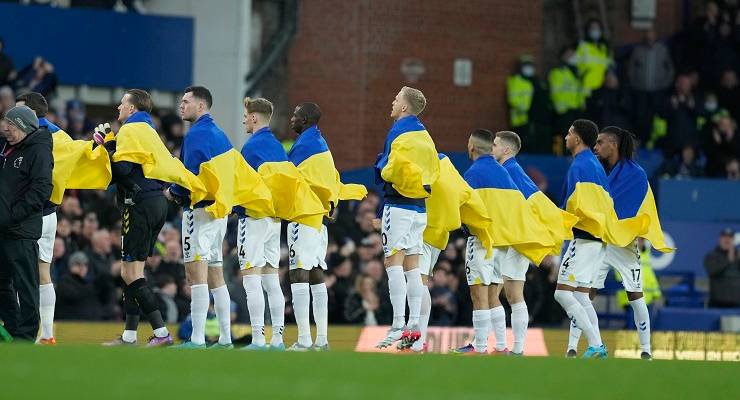
Some of the swiftest responses to Russia’s invasion of Ukraine last week came from international sport. A series of events were promptly cancelled, sponsorships were pulled and sanctions were installed. But will they really have any impact?
What’s been lost so far?
First to go was the Champions League final set to be played in St. Petersburg in May, with governing body UEFA quick to make the call to move the game to Paris. Formula 1 announced that “it is impossible to hold the Russian Grand Prix in the current circumstances”, foreshadowing a cancellation of the September race. On the tennis circuit, the ATP challenger tournament due to take place this week in Moscow has been cancelled.
Most recently, FIFA announced that no international soccer matches will be held in Russia. And while the Russian team will be allowed to compete in qualifiers for the 2022 World Cup, they will not be able to compete under the country’s name or flag, and the national anthem will not be played. FIFA’s statement said it hasn’t ruled out excluding Russia from qualifiers completely.
Sport sponsorship has also taken a massive hit, with soccer clubs Schalke 04 and Manchester United stepping back from sponsorship deals with Russian companies Gazprom and Aeroflot respectively. American Formula 1 team Haas is scrubbing the branding of Russia’s Uralkali from its car.
The International Olympic Committee (IOC) has condemned Russia’s invasion of Ukraine, but has yet to make any formal moves.
Do sport sanctions work?
Dr Roland Burke, historian at La Trobe University, says the potential for sports sanctions to have an impact is “modest and contingent on context”.
The best example of the efficacy of sports sanctions is those placed on apartheid South Africa. Dr Burke explains what made those sanctions effective: “They had excellent coverage, and even secondary consequences — that is, you could ‘acquire’ pariah status by competing against someone who had broken the sanctions.”
Burke also notes the centrality of rugby and cricket to the national identity of South Africa in giving extra impact to the sanctions.
More recently, pressure applied by the Women’s Tennis Association over the disappearance of Chinese player Peng Shuai saw some concessions made in accounting for her whereabouts. But although the women’s circuit continues to boycott China, the men’s tour has a number of events scheduled. Meanwhile the recent Beijing Winter Olympics went ahead with only a diplomatic boycott — no tangible impact was felt.
But even if sport sanctions don’t pack the punch of economic sanctions, they can still send a powerful message. And the symbolism of Russia being excluded from international sport is not insignificant. What will really count now is if the sporting community can hold its nerve and keep sporting sanctions with bite. Because aside from putting pressure on Russia, sport sanctions are playing an important role in signalling solidarity with Ukraine.
Andrew Mencinsky, a representative of the Ukrainian Council of NSW, told Crikey that sport sanctions would have a meaningful impact to Ukrainians.
“We want the level of sanctions seen during apartheid South Africa, so [Russia] become a pariah state. Ban them from the International Olympic Committee and then get them out properly. None of these bullshit Russian Olympic Committee arrangements where they have Russian colours, no more polite pressure.”








In the best Crikey fashion, you’ve missed the biggest story re sport/Ukraine – will FIFA permit Russia to qualify for this year’s World Cup? The three countries Russia could meet in qualifying playoffs have said they will not play, creating the possibility that Russia could qualify via forfeit. An embarrassing scenario to say the least.
And – if that is followed right through, right down the line – Russia will take the final. An own goal for a mob that Blatter headed.
What a pathetic response from FIFA. They are certainly living up to their reputation. They’re sooo worried about a few dollars, they’re refusing to ban Russia entirely from the World Cup. I hope all other countries involved will just refuse to play them, regardless of the consequence.
“The Clayton’s World Cup.”
Maybe we could arrange international sanctions on the US the next time they are involved in regime change. That should increase Aussies medal tally in a number of sports.
Are people really thinking this through.
As my mom always said “Whats good for the goose is good for the gander.”
I don’t disagree with you Maroochy. I think there will be much more scrutiny and action over any blatant US action in future, but in this case Putin didn’t even have a 9/11 to blame it on.
That’s what “the West” is outraged at. Copping some of their own medicine for a change. Typical that Western “Cancel Culture” gets involved in political matters now.
That sort of pounicng allowed Dean Lucan to win a Gold to decorate his fishing smack at LAX – ta, Fraser.
With the way that “Russia (politics)” plays sport for propaganda (just look at the treatment of Kamila Valieva – by her own ‘team’?) – though they aren’t the only ones – it would be like taking the crow out of the cock.
There is a Russian oligarch who owns a soccer team in the UK, who hasn’t been affected in any way by sanctions of any sort. Probably a mate or maybe cousin of Boris’s?
Chelsea’s Roman Abramovich, and there’s Max Demin of Bournemouth.
He’s looking nervous, has passed management/ownership to a form of arms length ‘stewardship’ etc. (but apparently there is no agreement yet and much criticism in UK media).
Thanks to the Tory Party/Govt. so far avoiding any real sanctions, hence, adopting tepid selective ones, also adopted by Morrison. Tories are on a hiding to nothing on their deep deep financial/influence links….. while old Labour tried to still support Putin/Russia e.g. Corbyn, via a signed petition, but most removed their signatures after the invasion when Starmer directed that it was out of order, both the invasion and petition (No doubt be pilloried for being ‘weak’).